- Home
- About Paul Taylor
About Paul Taylor: How And Why I Can Help With Hair Loss
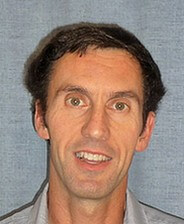
Hello, I'm Paul Taylor, author of this website and several other publications all about hair loss.
Many
years ago, I started losing my hair. It was a
moment in my life which marked the beginning of an incredible personal journey.
Very soon after my hair loss started, I learnt that there were missing pieces to the hair loss puzzle which had eluded scientists for years.
So, being very technically-minded, I
then spent several years conducting my own research, trying to
solve the mystery and find those missing pieces which would completely explain the hair loss process.
I Believe I Succeeded In That Goal
The research I did, led to the publication of an article I wrote for the Medical Hypotheses Journal (1).
My
research then continued, and I now have over 30 years experience with
hair loss. Experience that developed very specialist hair loss knowledge
from which, I think it's fair to say, I am now uniquely placed to offer my
own points of view, insight and suggestions to help other people solve their hair loss problems too.
My Background And Qualifications
Up until the age of 23, I was blissfully unaware of hair loss or the pain it can cause. Despite many male members of my extended family suffering from this condition, I had absolutely no idea what was in store for me just around the corner.
So I went to university and then embarked on my career just like anyone else.
In 1988 I graduated from Loughborough University in the UK with a B.Sc. honors degree in civil engineering. I then joined the Royal Air Force (RAF) for pilot training. And it was during this time that I first noticed my hairline beginning to recede.

Learning to fly an aircraft is obviously a very demanding occupation. But the stress involved was not the reason why I started losing hair. It was always going to affect me, just as it affects anyone else with the genetic tendency towards this type of hair loss.
However, it's probably true to say that the high pressure environment I was in didn't exactly help!
When I left the RAF, I worked for the civil service (Crown Prosecution Service) for two years in London before deciding to return to university for teacher training. I qualified as a mathematics teacher from Exeter University in 1993 and taught for a couple of years.
I then traveled the world, came back to Britain a year later and qualified as a licensed tennis coach with the Lawn Tennis Association. In pursuing that career, I also gained diplomas in advanced nutrition and sports psychology.
So, as you can see, I've had quite a colorful career so far. A career that largely focused on education. Even in my spare time I studied!
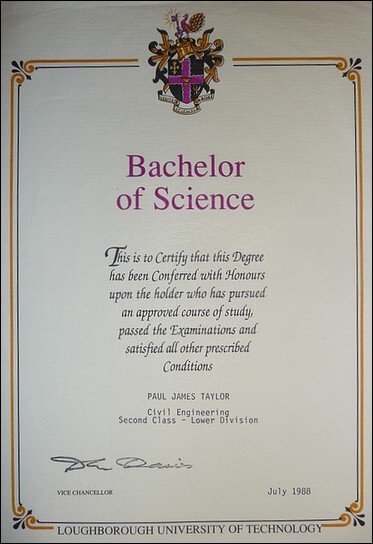 B.Sc. Hons Degree (Civil Engineering)
B.Sc. Hons Degree (Civil Engineering)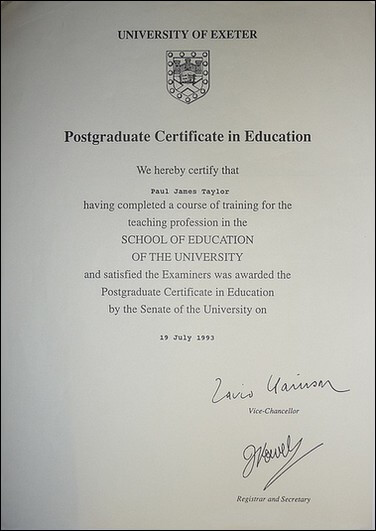 PGCE (teaching qualification)
PGCE (teaching qualification)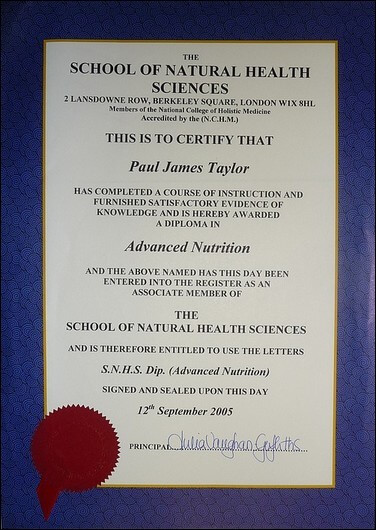 Advanced Nutrition Diploma
Advanced Nutrition DiplomaI
believe that if you analyze hard enough and dedicate yourself for long
enough, you can solve almost any problem...
And That Includes Hair Loss!
After I realized I was losing my hair back in 1989, it then rapidly progressed within just a couple of years.
And I was not happy about it!
In the photos below, the left picture was taken in 1991 (age 25) when my hair had only just started thinning at the crown but was already rapidly receding at the hairline. Although this was something I tried very hard to cover up, you can still see how quickly my temples receded away in just two years (see red arrow).
My hair loss continued getting worse and worse from 1989 to 1996. Then I finally figured out how to reverse it (photo on the right).
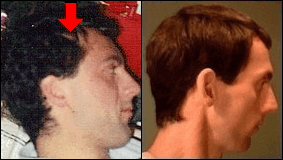
I believe my qualifications and work experience gave me a unique perspective from which to view this problem.
A perspective no doubt very different from that which dermatologists, trichologists, etc. learn as medical students, whereby they're just taught the established theory for hair loss, and instructed to use only conventional drug products and treatments that have FDA approval.
All that studying I did developed a very analytical approach to problem solving. And that's how I eventually realized that skull expansion is the underlying reason behind this type of hair loss (male pattern baldness).
I was 30 when that happened. And very soon afterwards, I developed techniques which successfully kick-started hair regrowth. My techniques gave me the healthy head of hair I still have today. And I'm extremely pleased with the results.
Once hair loss hit me, I felt uneasy about the idea of using drugs (minoxidil) for treatment. So that's why I wanted to find my own alternative solution. I wish it hadn't taken me all those years to figure it out, but at least I got there in the end!
Later on I wrote the Medical Hypotheses Journal article (mentioned above), an ebook to give other men and women who are losing their hair an opportunity to try my methods, and HairGrowthSOS.com so that people can learn about skull expansion.
"Hey Paul, I'd just like to say that
your website is terrific and really professional. After reading
everything, I definitely agree with the skull expansion theory.
Everything adds up like pieces in a puzzle."
Andrew Kelly
My Goals
I aim to help you as much as I can by providing information which is:
Safe - Some products and treatments can cause nasty side effects or pose health risks. And they can also waste a huge amount of money if, after months of trying them, they fail to work. I aim to reveal such risks to help people make informed decisions before they buy into the hyped-up marketing and misleading claims that some companies seem to have.
Reliable - My work is based on solid scientific evidence (medical journal articles, etc.) and kept as up-to-date as possible.
Independent - This website has no sponsorship or affiliation with any company, and I am not paid to promote any third party products. Adverts do appear on some pages (revenue to help run the site) but that's all. My reviews and articles simply state the facts and offer my own opinions.
Easy to read - Hair loss research can be complicated, so some of my articles do need to be quite long to make sure you get all the important information. But I always try to make my articles interesting and very easy to read.
I have three main goals for this website:
1. To help as many men and women as possible find solutions to their hair loss problems by providing top quality articles and product reviews (I also suggest they might like to consider my own approach to hair loss).
2. Expose any individual or company that does not appear to be completely honest in their claims, or have the safety and best interests of their customers in mind.
3. To work with hair loss professionals who are in a position to help further research, test and ultimately prove skull expansion as the primary mechanism that drives the hair loss process.
"Wow - incredible. However you pioneered the skull expansion concept and concluded all of these findings and treatments is a feat of a lifetime in itself. This is revolutionary scientific study without a doubt.
You should be everywhere in the media really with this evidence! I mean daily news shows, morning shows, etc... I just wish that was how the media worked.
I totally encourage you to press forward with your scientific study and before long we'll see skull expansion attributed as the cause of hair loss by media worldwide.
I just wanted to congratulate you on your research.
Thanks again Paul, your work means a lot to me."
Mr M. Jefferson, UK
Comments and Questions?
I welcome contact any time from anyone who is interested in my work.
Specifically, I invite experts in the field of hair loss who are in a position to conduct further research into my skull expansion hypothesis.
My hope is that, through collaborative work with medically trained professionals (perhaps doctors or trichologists working in a university faculty, hospital, hair loss clinic, etc.) skull expansion can finally be confirmed as the primary mechanism that drives the hair loss process (androgenetic alopecia).
Please use the form below for this.
Note: currently, replies
are mostly made at the weekend. However, I've now become incredibly busy
with a very high workload and I have to keep my emails very brief I'm
afraid - so, delays are now likely before I can reply. Thanks for
understanding. Paul Taylor.
For general inquiries, please use my contact page.
Comments and questions can also be left in the comments section beneath many of my articles.
To learn more about how hair loss affected me, read my hair regrowth success story.
Best wishes, Paul Taylor.
Note: There are many types of hair loss. Always consult with a doctor to find out which type is affecting you and how best to treat it.
|
Like this page? |
|

